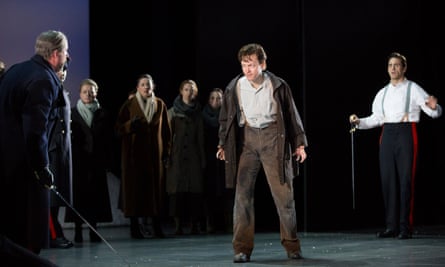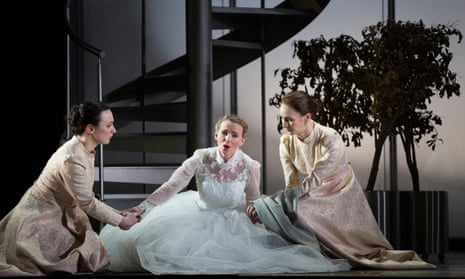“Enjoy yourself,” sings a caustic Ariodante in this darkest of baroque operas. Violins ripple under the melody, and a quiet bassoon steps in where the voice chokes up. The aria is Scherza infida – music that carries profound hurt via pretty simple means, but a total synergy between singer and pit. It’s Handel at his most brilliant.
Caitlin Hulcup sings it well in Scottish Opera’s new production: her Ariodante is baffled, callow, subtle. Yet the orchestra under Nicholas Kraemer plays only functionally, and the same goes for much of the long evening. Kraemer scrubs out vibrato to get a period-ish sound, but doesn’t muster enough verve to match the singers, and I craved more direction in bass lines, more shape in phrases, more spark in syncopations. The cast has to work hard.
Much of the singing is beautiful, though. Sarah Tynan’s Ginevra is dignified and ardent, her voice luminous and agile. Neal Davies is a sonorous King; Jennifer France is show-stealing as a limpid and graceful Dalinda. Xavier Sabata borders panto baddy as Polinesso, stropping and scheming while committing sexual abuse. His voice is robust but the delivery jars, especially beside the more subtly drawn female characters.

Director Harry Fehr and designer Yannis Thavoris have made a tight budget go far. The setting is a frontier community somewhere cold: a slick regime with puritanical Christian vibes, and snowy wilderness suggesting American bible belt, maybe Sarah Palin’s Alaska. The curtain rises on a public hanging, feet still twitching under the noose, and in general Fehr isn’t shy of overt imagery. He’s made some big cuts to the score (Ariodante’s bright aria Con l’ali di constanza’ is gone), but oddly leaves in plenty of dubious dance passages. Nothing drags quite like a bit of symbolic blindfolded ballet.
- At Theatre Royal, Glasgow, 18 and 20 February. Box office: 0844 871 7627. Festival Theatre, Edinburgh, 24, 27 February. Box office: 0131 529 6000. More details here.

Comments (…)
Sign in or create your Guardian account to join the discussion